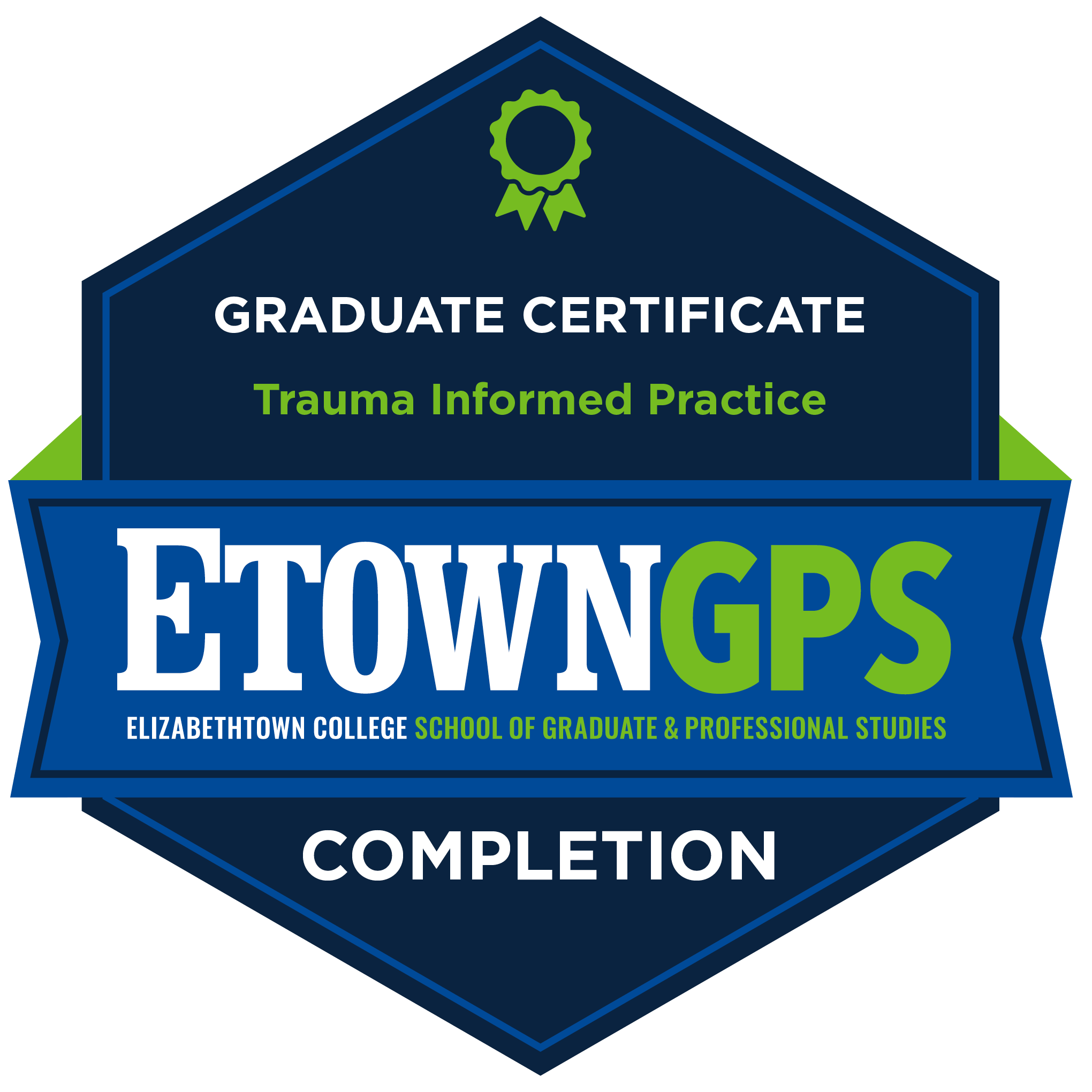Why Earn a Graduate Certificate in Trauma Informed Practice with Etown?
The Graduate Certificate in Trauma Informed Practice at Elizabethtown College is highly beneficial for professionals in education, health, and human services. It provides essential knowledge and skills to support children who have experienced trauma. The program's unique curriculum, designed for in-service professionals, focuses on implementing trauma-informed approaches and fostering multidisciplinary collaboration. This specialization is critical in today's landscape, where understanding and addressing the impact of trauma is increasingly important for professionals working with children and families.
In addition, this certificate can be completed in less than a year and all credits can be stacked into Etown's M.Ed. in Curriculum and Instruction as well as the Doctorate of Occupational Therapy, providing a clear path to further education.
Program Outcomes:
- Assess the short-term and long-term impact of trauma on the developing child.
- Implement trauma-informed approaches within their field of practice.
- Establish cross-system collaborations with other practitioners serving children and families experiencing trauma.
- Advocate for trauma-sensitive school and organizational change.
- Enhance your existing Level I or Level II teaching certificate. Earn a Pennsylvania Department of Education (PDE) Endorsement in Social, Emotional, and Behavioral Wellness of PreK-12 Students.
The Trauma Informed Practice Graduate Certificate aligns with the competencies set by the Pennsylvania Department of Education’s Common Ground Framework for Trauma-Aware Mental Health and Wellness Standards which include Cultural Awareness, Trauma-Aware, Mental Health and Wellness, and Technological and Virtual Engagement.
Empowering Care Through Trauma-Informed Practice
The Trauma Informed Practice certificate program opens up a range of career opportunities for professionals in various fields. It's particularly beneficial for those in mental health and behavioral counseling, nursing, human services, youth and career counseling, social work, health education, healthcare therapy, patient support, and teaching. These roles, increasingly focusing on trauma-informed care and support, are in demand, making the skills acquired through this program valuable assets in the healthcare and education sectors.
Also setting this program apart is the fact the credits earned can be stacked into Etown's M.Ed. in Curriculum and Instruction, as well as the Doctorate of Occupational Therapy program for a streamlined pathway for educational advancement.
Understand Tuition Costs and Explore Scholarship Opportunities
SGPS Holiday Discount
Apply by Dec. 31 to receive 20% off your first Etown SGPS spring course beginning Jan. 12, 2026!
Apply Today
X
SGPS Holiday Discount
Apply by Dec. 31 to receive 20% off your first Etown SGPS spring course beginning Jan. 12, 2026!
Apply TodayX
The Graduate Certificate in Trauma Informed Practice is priced at $525 per credit. Scholarships and financial aid are available to make your Etown SGPS education even more affordable. Below are just a few of the scholarships and programs available to students:
- Alumni Scholarship: 15% tuition discount, available to Elizabethtown College alumni.
- Affinity Partner Scholarship: 15% discount, offered to employees of organizations partnered with Etown SGPS.
- Jay Fellowship Referral Program: This is a referral program that benefits both current students/alumni and prospective students. When a student or alum refers a new student, both the referrer and the referred student receive a complimentary credit for their program of interest.
- Additional Scholarships for Adult Learners: Discover scholarship opportunities designed to support adult learners in achieving their academic goals. View more information on Scholarships for Adult Learners.
Tuition and fees are reviewed and subject to change annually.
Tuition & AidOnline Graduate Certificate in Trauma Informed Practice
The Trauma Informed Practice Graduate Certificate from Elizabethtown College requires 12 credit hours of academic work. Students must take at least 9 credits through Elizabethtown College to be awarded the graduate certificate.
Showcase Your Achievement
Upon completing the program, you’ll receive a digital Credly badge — a verified credential that recognizes your accomplishment. Credly will email you with instructions on how to accept and share your badge. You can easily add it to your LinkedIn profile, resume, or any platform where you want to highlight your achievements.
For questions, contact the School of Graduate and Professional Studies.

Application Requirements & Process
To be eligible to apply to any of our graduate certificate programs you will need to:
- Have a baccalaureate degree from a regionally accredited college or university.
- Have an undergraduate grade point average of 3.0 or higher (waivers can be granted based on professional work experience and other factors).
-
Complete the graduate application via GradCAS which includes the submission of a $38 nonrefundable application fee.
- You will need to request your official transcript from the undergraduate institution that conferred your bachelor’s degree and upload your current resume.
- Additionally, prepare a 1-2 page essay addressing your motivation for pursuing the graduate certificate, a statement of professional goals, and goals for the application of the graduate certificate to your professional life.
- After submitting your application, the SGPS Team will review it and make an admissions decision.
- If accepted, you will receive an initial offer letter via the applicant portal, which you must accept to proceed with matriculation.
- If the admissions staff have any questions about your application, they will contact you. If you’re unsure about anything, you can reach out or meet with our admissions staff for guidance.
- After successfully completing your Elizabethtown College graduate certificate, students may complete the Advance in Graduate Certificate or Degree form in the Jayweb student portal to apply to a future graduate certificate or graduate degree. Additional materials may be required, depending on the program of interest.





